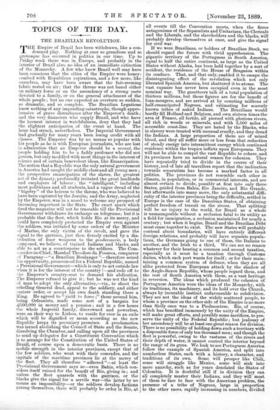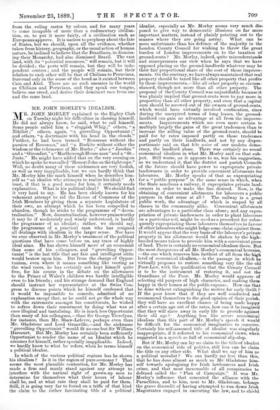TOPICS OF THE DAY.
'HIE BRAZILIAN REVOLUTION. THE Empire of Brazil has been withdrawn, like a con- demned play. Nothing at once so grandiose and so grotesque has occurred in politics in our time. Up to Friday week there was in Europe, and probably in the interior of Brazil also, no idea of an immediate extinction of the Monarchy. A few who knew Brazil well may have been conscious that the cities of the Empire were honey- combed with Republican aspirations, and a few more, like ourselves, may have been aware that the fair-seeming fabric rested on air ; that the throne was not based either on military force or on the ascendency of a strong caste devoted to a family, or on the general attachment of the whole people ; but no one expected an overturn so sudden, so dramatic, and so complete. The Brazilian Legations knew nothing of any impending catastrophe, though appre- hensive of grave disturbance after the Emperor's death ; and the very financiers who supply Brazil, and who have the keenest interest in watchfulness, deny that they had the slightest anticipation of the event at hand. The hour had struck, nevertheless. The Imperial Government had gradually for many years been losing credit with all classes. The Emperor was by no means so popular with his people as he is with European journalists, who are lost in admiration that an Emperor should be a savant, the people holding him to be a faddy professor who did not govern, but only meddled with most things in the interest of science and of certain benevolent ideas, like Emancipation. The notion that a Republic was the only natural government in America had caught the middle class and all young men ; the prospective emancipation of the slaves, the greatest act of the dynasty, profoundly irritated the great landlords and employers of labour ; the " intelligent," including most politicians and all students, had a vague dread of the " bigotry " of the heiress to the throne, who was believed to have been captured by the Jesuits; and the Army, neglected by the Emperor, was in a mood. to welcome any prospect of becoming important in the State. The exact spark which fired the magazine will not be traceable till the Provisional Government withdraws its embargo on telegrams; but it is probable that the fleet, which holds Rio at its mercy, and could have completely protected the Empire even against the soldiers, was irritated by some orders of the Minister of Marine, the only victim of the revolt, and gave the signal to the garrison, just then fiercely excited. by a dis- tribution of finer weapons to the gendarmerie, a body composed, we believe, of trained. Indians and blacks, and able to act as a counterpoise to the soldiers. The Com- mander-in-Chief, Marshal Theodore da Fonseca, conqueror of Paraguay—" a Brazilian Boulanger "—therefore seized his opportunity, pronounced for a Federal Republic, named a Provisional Government—which is only to act outside law when it is for the interest of the country !—and rode off to the Emperor's country-seat to demand his abdication. The Emperor refused to give it ; but he was not the kind. of man to adopt the only alternative,—viz., to shoot the rebelling General dead, appeal to the soldiery, and either restore order, or accept his own death standing there a King. He agreed to " yield to force ;" those around him, being Orleanists, made some sort of a bargain for £500,000 in money and a pension ; and in a few hours the whole Imperial family, discrowned and powerless, were on their way to Lisbon, to reside for ever in an exile which will be dignified or mean according as the new Republic keeps its pecuniary promises. A proclamation was issued abolishing the Council of State and the Senate, dissolving the Chamber, and calling upon all the provinces to send up delegates for a Constituent Convention which is to arrange for the Constitution of the United States of Brazil, of course upon a democratic basis. There is no mobile strength in the interior provinces, except that of the few soldiers, who went with their comrades, and the capitals of the maritime provinces lie at the mercy of the fleet. They all therefore " adhered "—at least the Provisional Government says so—even Bahia, which con- siders itself ruined for the bent* of Rio, giving in ; and unless the fleet quarrels with the garrison, or the blacks give the signal for a servile war—the latter by no means an impossibility—or the soldiers develop ftwiions among themselves, there will probably be order in Rio, at all events till the Convention meets, when the fierce antagonisms of the Separatists and Unitarians, the Clericals- and the Liberals, and the slaveholders and the blacks, will probably develop themselves at once, and give the signal for civil war.
If we were Brazilians, or holders of Brazilian Stock, we• should regard the future with vivid apprehension. The- gigantic territory of the Portuguese in South America,. equal to half the entire continent, as large as the United States without Alaska, has been held together by a sort of accident, the residence of the House of Braganza within its confines. That, and that only, enabled it to escape the disintegrating effect of the revolution which not only liberated Spanish America, but shattered it to atoms. The vast expanse has never been occupied even in the most nominal way. The gazetteers talk of a total population of thirteen millions, but those figures are for the benefit of loan-mongers, and are arrived. at by counting millions of half-emancipated Negroes, and estimating for scarcely known tribes of naked Indians. The Brazilians would hardly fill Holland and Belgium, and own sixteen times the area of France, all fertile, all pierced with glorious rivers, all rich in woods or minerals, and with 3,500 miles of accessible coast-line. They are hated by the Blacks, who in slavery were treated with unusual cruelty, and they dread the Indians. A large proportion of them are of mixed.. blood, and they all suffer more or less from that reduction of steady energy into intermittent energy which continued residence within the tropics inflicts upon Europeans. They will not be able to compel the vast Republic to cohere, and its provinces have no natural reason for cohesion. They have repeatedly tried to divide in the course of their history, and of late all travellers report that the inclination towards separatism has become a marked factor in all politics. The provinces do not resemble each other in climate, in population, or in commercial interests, and are almost certain to divide, possibly at first into only three. States, guided from Bahia, Rio Janeiro, and Rio Grande, but afterwards into many more, the only substantial diffi- culty of the interior provinces being the difficulty, settled in Europe in the case of the Danubian States, of obtaining perfect freedom of transit on the rivers. That splitting- will be no injury to the world, for Brazil as a whole is unmanageable without a seclusion fatal to its utility as a field for immigration, a seclusion maintained for nearly a century; but when it begins, Brazil and the Brazilian Debt must cease together to exist. The new States will probably contend about boundaries, will have entirely different foreign relations, and probably will have separate popula- tions, the Germans going to one of them, the Italians to another, and the Irish to a third, We can see no reason whatever for their bearing a common and second taxation, especially as it must be a taxation through Customs duties, which each port wants for itself ; or for their main- taining a common system of defence, when they are all alike protected. from European attack by the shadow of the Anglo-Saxon Republic, whose people regard them, and the rest of South America with them, as a vast heritage in reversion. The ideas which produced the cohesion of Portuguese America were the ideas of the Monarchy, with its traditions, its machinery, and its hold. over the Church,. always by incurable instinct unfavourable to subdivision. They are not the ideas of the widely scattered people, to whom a province on the other side of the Empire is no more than Sicily once was to a Piedmontese. Rio, of course, which has benefited immensely by the unity of the Empire,. will make great efforts, and possibly some sacrifices, to pre- serve the unity of the Federal Republic ; but jealousy of her ascendency will be at least one great reason for division. There is no possibility of holding down such a territory with a disposable force of only ten thousand men; and though the fleet is powerful, owing to the vastness of the rivers and their depth of water, it cannot control the interior beyond the range of its guns. We look to see Portuguese America. follow the example of Spanish America, and split into numberless States, each with a history, a character, and traditions of its own. Some will prosper like Chili, some will struggle like Mexico, some will sink into. mere anarchy, such as for years desolated the States of Colombia. It is doubtful still if in division they can all completely master their Indians, and they will most of them be face to face with the American problem, the presence of a tribe of Negroes, large in proportion to the other races, rapidly increasing in numbers, divided from the ruling castes by colour, and for many years to come incapable of more than a rudimentary civilisa- tion, or, to put it more fairly, of a civilisation such as Europeans approve. It is useless to prophesy about the fate of States, but we should, upon all the evidence, whether taken from history, geography, or the usual action of human nature, be inclined to believe that the Brazilians, in dismiss- ing their Monarchy, had also dismissed Brazil. The vast land, with its " potential resources," will remain, but it will be divided ; the ports will remain, but they will be inde- pendent centres ; and the people will remain, but their relation to each other will be that of Chilians to Peruvians, fraternal only in the sense of the bond as it existed between Cain and Abel. There are no such enemies in the world as Chilians and Peruvians, and they speak one tongue, believe one creed, and derive their dominant race from one and the same laud.







































 Previous page
Previous page